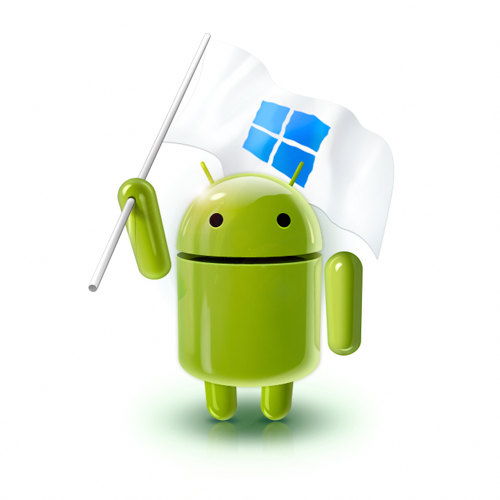Chester Ng is the co-founder and CMO of SweetLabs.
With the constant talk of Samsung pulling an Amazon and someday forking Android, it is frankly hard to imagine a compelling Samsung device that is missing Google Search, Gmail, Google Docs, Google Maps, and YouTube.
However, the one company that could ironically provide the most compelling fork of Android is Microsoft.
Introducing Windroid… (Bear with me here, it sounded better than “Andows.”)
[Editor’s note: A “fork,” in development terms, is a different version of an operating system. Amazon, for instance, has created its own “forked” version of Android for its Kindle Fire tablets.]
A Windroid phone could run Android apps, enabling Microsoft to cherry pick the best apps from the enormous Android universe to boost their app store catalog. This could also save Microsoft the massive pain of begging for table scraps from top app developers and ending up with inferior versions of popular apps like Instagram for Windows Phone. Windroid could still support Windows Phone apps in parallel, enabling Microsoft to piggyback the Android app ecosystem while building out its own.
A Windroid phone could have exclusive (or, at least the best) integration of Word, Excel, Powerpoint for productivity, Skype for communications, Xbox for entertainment, Nook for reading, Bing for search and navigation, IE for browsing, and so forth. Microsoft is the one company that can replace nearly all of Google’s services one-for-one with a compelling alternative.
A Windroid phone could be offered at a lower cost than traditional Android to device makers and consumers if Microsoft waived the $5-10 per-unit patent royalty it currently collects. Waiving that royalty would be a boon for device makers, as the fee is equivalent to a substantial portion of the tiny margin that manufacturers generate on Android devices. Microsoft could go one step further and boost razor-thin device margins with an aggressive revenue-share on apps, games, books, Skype, Bing with the manufacturers, addressing a major pain point that device makers privately gripe about Google and Android today.
If Windroid wanted to sweeten its offering even more, Microsoft could acquire a top music app (e.g. Spotify), top messaging app (e.g. WhatsApp), top productivity app (e.g. Evernote), or even spend a mere $10 billion a year on the top apps like Jason Calacanis suggests, to add these services to its arsenal. Then, Microsoft could call its “enemy of our enemy is our friend” pals like Facebook, Twitter, and Foursquare to join this collective effort to help destabilize Google’s market dominance, with deeper integration of their apps into Windroid.
What you would now have is an offering with all of the top apps, better integration of the most popular daily services, substantially lower device prices, and an army of incentivized manufacturers bearing a Windroid flag.
We’ve seen this happen before: An operating system achieves dominant market share, with major manufacturers building devices for this OS and major developers building apps for this OS. One particularly large developer builds a killer suite of services (search, browsing, communications, productivity, navigation, entertainment) on this OS. Consumers become addicted to these services more so than the OS, and that once-dominant OS is reduced to a bag of hardware drivers.
If it sounds a bit like what Google has tried to do to Microsoft (Windows) over the past decade, there is no reason it couldn’t also describe what Microsoft tries to do to Google (Android) over the next decade.
Microsoft is about to hire a new CEO who will be looking to make a bold move in an effort to “turn around” the most formidable and profitable “underdog” in technology history. A move like this would only reinforce Microsoft’s “devices and services” company mantra. What better way to pull together “One Microsoft” than rally all its troops for an epic battle… right on Google’s home turf – Android!
Still think a Samsung fork of Android is Google’s worst nightmare?
VentureBeat's mission is to be a digital town square for technical decision-makers to gain knowledge about transformative enterprise technology and transact. Learn More

